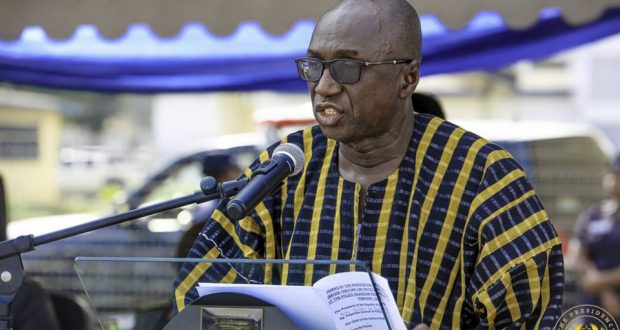Akuffo-Addo government not condoning vigilantism – Ambrose Dery
- Posted on
- Comment

The Minister of Interior, Ambrose Dery, believes the government has exhibited ample commitment towards the fight against political party vigilantism in the country, considering that they did not shield the 13 members of the pro-NPP vigilante group, Invincible Forces, but rather allowed them to go through the court process.
The 13, who were prosecuted for assaulting the Ashanti Regional Security Coordinator in March 2017 in protest against his appointment, were finally sentenced to a fine of Ghc1,800 each and made to sign a bond of good behavior.
This was after their charges were reviewed from assaulting a public officer and causing unlawful damage to rioting.
It would be recalled that, during the trial, the 13 suspects were freed from open court allegedly by their colleagues, who were angered by the decision of the judge at the time to remand them into police custody.
The 13 suspects later turned themselves into the court and were made to sign a bond of good behavior, and fined Ghc2,400 cedis each.
But under rather bizarre circumstances, the eight persons who raided the court were freed for lack of evidence, a development that was widely condemned, considering the threat that action posed to the judiciary.
Following these developments, many have described the fines slapped on the 13 as weak, and a subtle attempt by the government to ensure that the culprits who are members of the ruling party do not spend time in jail.
Mr. Dery, however, downplayed these suggestions, insisting government prosecuted the 13 Delta Force members although they are believed to be members of the NPP.
He said the government cannot be blamed for the sentence handed to them by the judiciary.
“…Vigilantism is real, and the Akufo-Addo government hasn’t run away from it. This is the government that has taken people that are known as its supporters and sent to court, they went through due process, they were convicted and they were sentenced.
“I’ve heard people say that the sentences are not harsh enough, but let’s put it in context. The law in the kind of offenses they were charged with encourages reconciliation and settlements outside. If you put it in that context, we didn’t even allow a settlement of the matter which would have still been within the law. We sent it there, and it’s not our remit. It’s the remit of the judiciary, and the judiciary has taken a decision – they have been convicted, they have been sentenced… so we need to go beyond mere criticism to find out what are the legal limitations in sentencing. What are the considerations in sentencing; but what I can say with pride is that we are not condoning any actions,” he explained.
Source: Citifmonline










 (Selorm) |
(Selorm) |  (Nana Kwesi)
(Nana Kwesi)